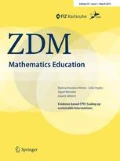Abstract
Sociocultural theories view teacher learning as changing participation in social practices that develop their professional identities rather than as acquisition of new knowledge or beliefs that are internal to the individual. Although sociocultural research on mathematics teacher education has tended to focus on understanding teachers’ learning, this article argues that sociocultural perspectives can also guide more interventionist research involving changing classroom practice. The approach illustrated here uses an adaptation of Valsiner’s zone theory to analyse teacher learning and development in two separate research studies. In one study the aim was to understand how teachers incorporated digital technologies into their practice, while the other study helped teachers implement an investigative approach to working mathematically consistent with a new syllabus. In both studies, productive tensions between teachers’ beliefs, contexts, and goals were a trigger for learning and development.




Similar content being viewed by others
References
Adler, J., Ball, D., Krainer, K., Lin, F.-L., & Novotna, J. (2005). Reflections on an emerging field: Researching mathematics teacher education. Educational Studies in Mathematics, 60, 359–381.
Australian Education Council. (1991). A national statement on mathematics for Australian schools. Melbourne: Curriculum Council.
Beswick, K. (2005). The beliefs/practice connection in broadly defined contexts. Mathematics Education Research Journal, 17(2), 39–68.
Blömeke, S., Suhl, U., Kaiser, G., & Döhrmann, M. (2012). Family background, entry selectivity and opportunities to learn: What matters in primary teacher education? An international comparison of fifteen countries. Teaching and Teacher Education, 28(1), 44–55.
Cooney, T. (2001). Considering the paradoxes, perils, and purposes of conceptualizing teacher development. In F. Lin & T. J. Cooney (Eds.), Making sense of mathematics teacher education (pp. 9–31). Dordrecht: Kluwer.
Diezmann, C., Watters, J., & English, L. (2001). Implementing mathematical investigations with young children. In J. Bobis, B. Perry, & M. Mitchelmore (Eds.), Numeracy and beyond (Proceedings of the 24th annual conference of the Mathematics Education Research Group of Australasia (pp. 170–177). Sydney: MERGA.
Döhrmann, M., Kaiser, G., & Blömeke, S. (2012). The conceptualisation of mathematics competencies in the international teacher education study TEDS-M. ZDM—The International Journal on Mathematics Education, 44(3), 325–340.
Felbrich, A., Kaiser, G., & Schmotz, C. (2012). The cultural dimension of beliefs: An investigation of future primary teachers’ epistemological beliefs concerning the nature of mathematics in 15 countries. ZDM—The International Journal on Mathematics Education, 44(3), 355–366.
Goos, M. (2005). A sociocultural analysis of the development of pre-service and beginning teachers’ pedagogical identities as users of technology. Journal of Mathematics Teacher Education, 8, 35–59.
Goos, M. (2008). Sociocultural perspectives on learning to teach mathematics. In B. Jaworski & T. Wood (Eds.), The international handbook of mathematics teacher education. The mathematics teacher educator as a developing professional (Vol. 4, pp. 75–91). Rotterdam: Sense Publishers.
Goos, M. (2009). A sociocultural framework for understanding technology integration in secondary school mathematics. In M. Tzekaki, M. Kaldrimidou, & H. Sakonidis (Eds.), Proceedings of the 33rd conference of the International Group for the Psychology of Mathematics Education (Vol. 1, pp. 113–120). Thessaloniki: PME.
Goos, M., Dole, S., & Makar, K. (2007). Designing professional development to support teachers’ learning in complex environments. Mathematics Teacher Education and Development, 8, 23–47.
Goos, M., Galbraith, P., Renshaw, P., & Geiger, V. (2003). Perspectives on technology mediated learning in secondary school mathematics classrooms. Journal of Mathematical Behavior, 22, 73–89.
Lerman, S. (2000). The social turn in mathematics education research. In J. Boaler (Ed.), Multiple perspectives on mathematics teaching and learning (pp. 19–44). Westport, CT: Ablex Publishing.
Lerman, S. (2001). A review of research perspectives on mathematics teacher education. In F. Lin & T. J. Cooney (Eds.), Making sense of mathematics teacher education (pp. 33–52). Dordrecht: Kluwer.
National Council of Teachers of Mathematics. (2000). Principles and standards for school mathematics. Reston, VA: NCTM.
Perry, B., Howard, P., & Tracey, D. (1999). Head teachers’ beliefs about the learning and teaching of mathematics. Mathematics Education Research Journal, 11(1), 39–53.
Queensland Studies Authority. (2004). Mathematics years 1–10 syllabus. Brisbane: Author.
Sfard, A., & Prusak, A. (2005). Telling identities: In search of an analytic tool for investigating learning as a culturally shaped activity. Educational Researcher, 34(4), 14–22.
Shulman, L. S. (1987). Knowledge and teaching: Foundations of the new reform. Harvard Educational Review, 57(1), 1–22.
Stacey, K. (2003). The need to increase attention to mathematical reasoning. In H. Hollingsworth, J. Lokan, & B. McCrae (Eds.), Teaching mathematics in Australia: Results from the TIMSS 1999 Video Study (pp. 119–122). Melbourne: Australian Council for Educational Research.
Valsiner, J. (1997). Culture and the development of children’s action: A theory of human development (2nd ed.). New York: Wiley.
Vygotsky, L. (1978). Mind in society. Cambridge, MA: Harvard University Press.
Wenger, E. (1998). Communities of practice: Learning, meaning and identity. Cambridge, MA: Cambridge University Press.
Author information
Authors and Affiliations
Corresponding author
Rights and permissions
About this article
Cite this article
Goos, M. Sociocultural perspectives in research on and with mathematics teachers: a zone theory approach. ZDM Mathematics Education 45, 521–533 (2013). https://doi.org/10.1007/s11858-012-0477-z
Accepted:
Published:
Issue Date:
DOI: https://doi.org/10.1007/s11858-012-0477-z




